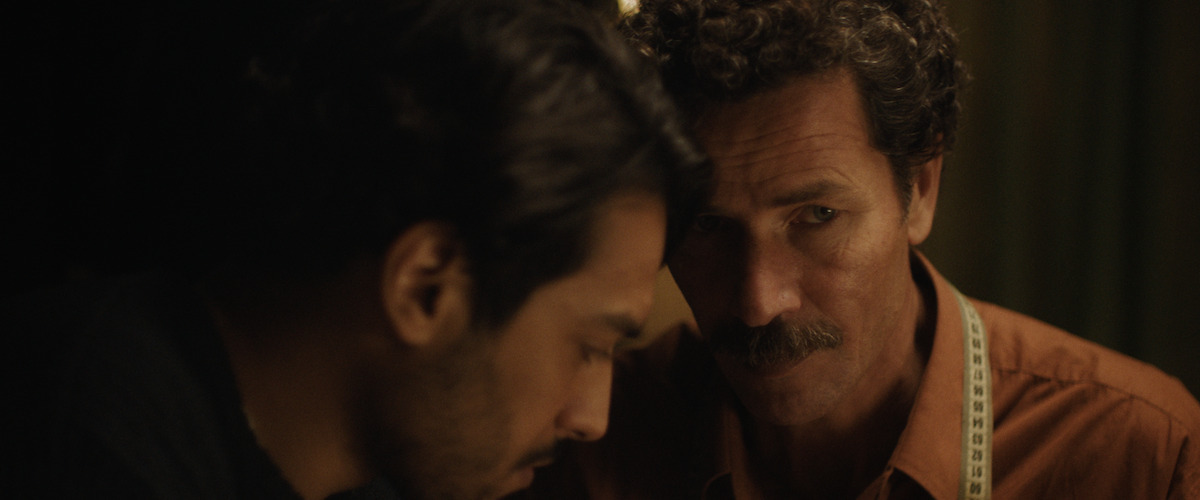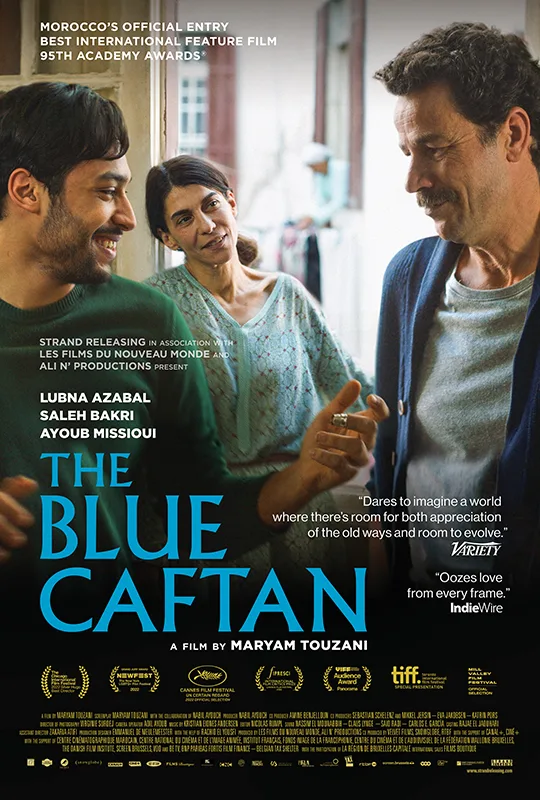In a medina in a northwestern city in Morocco, Halim (Saleh Bakri) and his wife Mina (Lubna Azabal) run a small shop specializing in traditional caftans. The art of this frequently ceremonial garment is a dying one. When Halim, a quiet and quietly handsome man who looks to be in his forties, hires a young apprentice, Youssef (Ayoub Missioui), the also-quiet young man shows a special appreciation for such components as braided gold thread. Halim tells his new hire that there are no “maalems” (masters) of this work left. And the shop’s customers aren’t as appreciative as they might be. They complain of the time it takes to craft an entirely by-hand garment, saying they’d settle for machine stitching.
But Halim won’t. And Mina backs him up all the way. She runs interference for him out front and is silently but plainly exasperated when clients ask for adjustments to create a more “modern” fit. As avid and apt a pupil as Youssef is, she’s not crazy about him either. “I think he’s genuinely interested in learning the craft,” Halim tells Mina. She thinks not. He’ll leave, like every other one, she believes. And then Halim will just get another. “Apprentices don’t grow on trees,” Halim observes.
The interest Halim and Youssef take in each other isn’t strictly professional. When Halim teaches Youssef a particular stitch, he does so haltingly, with patience, not just to put his point across but to partake of the particular intimate atmosphere he’s sharing with Youssef at that moment. And, of course, Mina notices. Outside the shop, the movie follows Halim to a local bathhouse, where he engages in sexual liaisons with men.
Mina is gravely ill, and prone to collapsing. As the movie progresses, we accept that she’s on her way out. Despite his longings, Halim is a loyal and diligent husband, and he does it out of more than a sense of duty. Later in the movie, he’ll tell Youssef that his mother died giving birth to him and that his father subsequently despised him. “Mina erased all that,” he concludes.
The situations in this scrupulous, compassionate, and quietly captivating picture, written and directed by Maryam Touzani, are tense, to be sure. But the movie itself doesn’t surrender to the tension. It depicts unruly passions as they stir the lives of circumspect characters. A bit of business involving missing fabric shows Mina acting out her resentments in a petty way. Mina has an evolving determination to live a little, to act with some spontaneity before her number is truly up. And there’s an abrupt confession from Youssef that confirms he’s aware of Halim’s attention.
The movie depicts all this and more with a steady, determined concentration on the day-to-day. There are no speeches. These people live in a society that doesn’t encourage rampant self-expression the way the West does. Feelings are expressed through actions, like how Halim takes over household cooking once Mina becomes too sick to work, or when Youssef reattaches himself to Halim and the shop after a brief estrangement.
And all the while, Halim works on the title blue caftan, commissioned by another fussbudget customer who doesn’t know how good she has it. He goes one stitch after another with transcendent patience, each stitch an individual action of distinctive stress that, once accomplished, yields a beautiful and unique item of apparel. The movie’s finale shows Halim bestowing it to the only person deserving of such a gift.
Now playing in theaters.




















